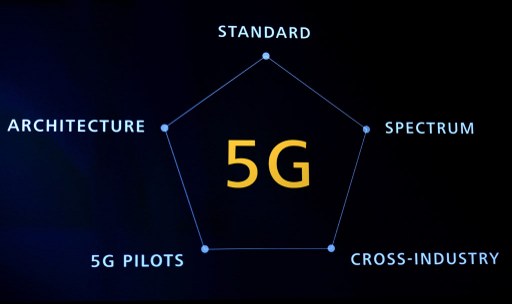
A screen shows information on 5G during a keynote address by CEO of Huawei Consumer Business Group Richard Yu at CES 2017 at The Venetian Las Vegas on January 5, 2017 in Las Vegas, Nevada. AFP FILE PHOTO
Chinese electronics giant Huawei is joining forces with the Philippines’ largest telco in the hopes of rolling out a 5G wireless network in the Asian archipelago by 2020, the Filipino company said Tuesday.
Filipinos are among the world’s most active Internet users, but the country also has one of the slowest average connection speeds.
Smartphone usage is also steadily growing with about 33 million people owning devices according to researchers.
Philippine Long Distance and Telephone Co. (PLDT) and Huawei agreed last month to conduct joint research and development into fifth-generation broadband wireless technology for the Philippines.
“They are one of the companies that are leading in the research and development of 5G technology,” PLDT spokesman Ramon Isberto said about the Chinese firm, adding it is already involved in PLDT’s landline and mobile phone services.
Chinese telecoms behemoth Huawei is the world’s number three smartphone maker, operating in 170 countries.
The company has laid out an ambitious agenda for the US and global markets — hoping to become the top producer of smartphones in the next five years despite controversy over its ties to Beijing.
Ren Zhengfei, a former People’s Liberation Army (PLA) engineer, founded the company in 1987 but his PLA service has led to concerns of close links with the Chinese military and government, which Huawei has consistently denied.
The US and Australia have previously barred Huawei from involvement in broadband projects over espionage fears.
Relations between Manila and Beijing have been rocky amid conflicting claims over the South China Sea and China’s militarization of the resource-rich waterway.
But under Philippine President Rodrigo Duterte, who won May elections in a landslide, there has been a warming of bilateral ties as Duterte steers Manila away from the US — its long-time defense treaty partner.
Isberto said controversy over Huawei’s links with the Chinese government was not a concern, stressing that foreign companies only provide technology.
“At the end of the day, we run our networks,” he said.